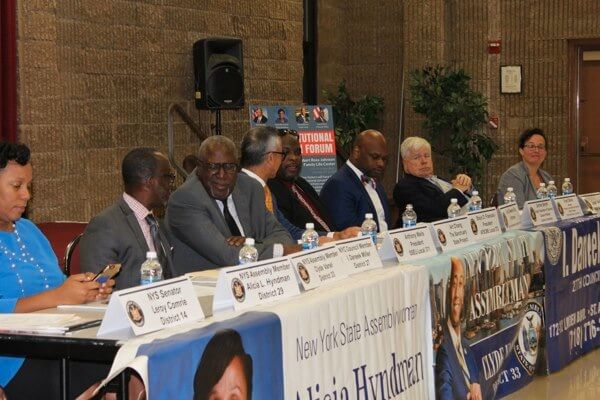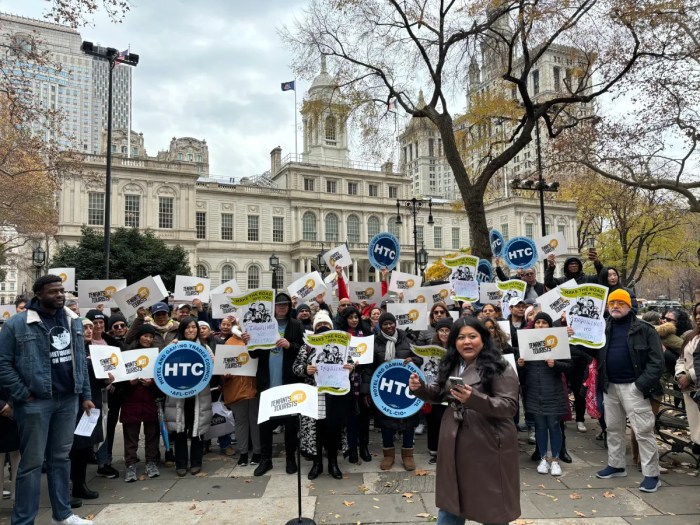By Naeisha Rose
State Sen. Leroy Comrie (D-St. Albans) hosted a town hall last week at the Robert Ross-Johnson Family Life Center in St. Albans with elected officials from southeast Queens and expert panelists to discuss a possible Constitutional Convention, one of the three proposals on the ballot in the general election Nov. 7.
Every 20 years there is a vote to tweak the state’s constitution or let it remain, according to New Yorkers Against Corruption, a bipartisan coalition. NYAC estimates it will cost taxpayers $300 million to redo the state charter if they vote for a new convention. If it passes, the convention will be held in the spring of 2019 with elected delegates from across the state.
Throughout the Oct. 3 event, panelists for and against rewriting the New York State Constitution made their arguments to a crowd of over 100 people and asked that they vote yes or vote no for a revised state charter.
Many opposed to a constitutional convention fear that pensions would be wiped away like in other states that allowed their constitutions to be changed, which resulted in unions being destroyed. They also fear aid for the poor might be denied and that a Republican-led Senate would not choose delegates representative of most New Yorkers. The VOTE NO group would rather have taxpayers’ money spent on funding education and infrastructure.
“If you look at the states that were mentioned — Kansas, Arizona, Wisconsin, Ohio and Iowa — the last time they opened up their conventions, they all became Right-to-Work states,” Comrie said. “Right-to-Work means there are no unions. Those states took away the opportunity for unionization and to lock in pensions from a sound basic job.”
Councilman I. Daneek Miller (D-St. Albans), along with state Assembly members Alicia Hyndman (D-Springfield Gardens) and Clyde Vanel (D-Queens Village), agreed with Comrie.
“We are sitting in the most densely populated union community in the entire country, which translates to the highest African-American homeownership in the entire country,” said Miller.. “Opening the constitution will have grave consequences.”
Chris Erikson Jr., a fifth-generation member of Local Union #3 IBEW and co-chairman of the Labor Caucus for Queens County Young Democrats, who was not at the meeting further explained what Right-to-Work meant.
“Right-to-Work has been around since the 1940s,” Erikson said. “Its sole purpose is to break the union movement in that state because unions are legally obligated to represent the workers that are a part of that organization, while those workers are not obligated to pay dues to the organization.”
Without dues, unions cannot collectively bargain to protect pensions, get raises for employees and better working conditions, according to Erikson.
The proponents of an updated constitution had a different view of the situation.
They believe a restructured charter could fast-track legislation that could reform how campaigns are financed, prevent gerrymandering and improve education.
The last New York convention was held in 1967 and failed to enact any changes in the constitution.
Art Chang, a representative for The Sanctuary State Project, addressed the concerns of the audience and made a plea for voting “yes” for a new constitution.
He and Evan Davis, the senior council at the Committee for a Constitutional Convention, explained that the money used for the convention is a drop in the state’s budget and would be spread out over the course of 20 years for taxpayers. They highlighted initiatives like free public school education and the worker’s bill of rights that were tackled in previous constitutional conventions.
He also showed a list of the pieces of legislation that could help New Yorkers, but without a majority vote may not pass as quickly or at all without this measure.
“We know the future can change and can change reliably to create opportunities for people to grow,” Chang said. “The question is do you want to stand still or move forward.”
Davis emphasized the need to update schools to meet the demands of the current job market.
“The great accomplishments of our state constitution have been won in Constitutional Conventions,” Davis said. “Right now our constitution only guarantees a sound basic education. We need more for the jobs of tomorrow.”
Dermot Smyth, the political action coordinator for the United Federation of Teachers in Queens, agreed with Miller, who opposes a convention.
“The moment that constitutional convention is opened, big money is going to start circulating in the background,” Smyth said. “It’s going to start a narrative. How bad public pensions are, how it’s hurting the taxpayer and how it’s hurting the government.”
All the panelists involved encouraged the audience to vote and to inform friends and families about the constitutional convention, because it is on the back of the ballot and people might fail to notice it.
The panelists also took issue with the breakaway Independent Democratic Caucus.
A lot of the legislation the Democratic members of the Senate want to pass cannot happen because of the IDC sharing power with Republicans, according to Comrie. This also means the changes that the progressives want in the referendum would be unlikely, unless Democrats retake the Senate.
“I’m telling youI’m voting no,” said Comrie. “The whole staffing of the convention would be up to the Republican majority in the state Senate. We don’t know how things are going to be shaped.”
Reach reporter Naeisha Rose by e-mail at nrose





































